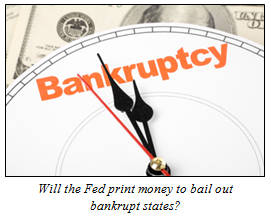By Howard Rich
While the extension of Bush-era tax cuts dominated headlines during the recently-concluded lame duck session of Congress, the coming year will bring with it a renewed focus on public debt — whether policymakers like it or not.
A fiscal reckoning is fast approaching — one that extends far beyond the $14 trillion in debt accumulated by politicians in Washington D.C. (a figure which has more than doubled over the last seven years). State and local government debt is also spiraling out of control — climbing to a record 22 percent of GDP this year.
And unlike the federal government, states and municipalities cannot simply print money to continue fueling their reckless expansion.
“We’ve been living in fantasy land,” liberal California Gov. Jerry Brown acknowledged last month in addressing California’s $19 billion deficit. “It is much worse than I thought. I’m shocked.”
Like their counterparts in Washington, D.C., state and local politicians engaged in an orgy of unsustainable spending leading up to the recession. From 2000-2007, total state and local spending increased from $1.73 trillion to $2.66 trillion — a 23.7 percent increase after adjusting for inflation.
Counting the “stimulus” years, total state and local government spending has now climbed above $3.2 trillion annually — a 49.2 percent increase from a decade ago after adjusting for inflation.
By comparison, America’s population grew by only 9.7 percent over the last decade.
After living on borrowed money (and borrowed time), the cost of maintaining unnecessarily large government at all levels is about to reach a breaking point. That means policymakers in Congress, state capitals, county council chambers and town halls all face a simple choice —scale back this rampant growth or generate new revenue through additional borrowing or tax increases.
Clearly tax hikes would cripple our economy — and after the November elections there is no way Washington will approve another federal bailout funded with borrowed billions. Also, with interest payments on the debt projected to reach half a trillion dollars annually within the next five years, the federal government simply cannot sustain any additional borrowing.
Assuming that state and local leaders lack the political will to make long-overdue cuts (a safe bet) , where will these “cash-strapped” governments turn as they face skyrocketing Medicaid premiums and plummeting property values?
Enter the Federal Reserve Bank, which in addition to keeping interest rates artificially low has been printing trillions of dollars over the last three years in an effort to prop up America’s faltering economy. Some economists are now speculating that the Fed may extend this “quantitative easing” policy to cover the purchase of state debt and municipal bonds — an unprecedented move that would only delay the inevitable fiscal reckoning.
“Given the difficulties faced by state and local governments, this may well be the route they choose, at least for some of the quantitative easing,” Dartmouth professor David Branchflower wrote recently.
Such a decision would have far-reaching ramifications for taxpayers. Most notably, it would create a mountain of new state and local debt — permitting these governmental entities to continuing spending in the same “consequence-free” environment while adding tremendous explosive power to a ticking fiscal time bomb.
And while the Fed is technically precluded from purchasing longer-maturity municipal bonds, Bernanke could invoke “emergency powers” at the secretive central bank to authorize these purchases — much like the Fed used its emergency powers to dole out $3.3 trillion in loans during the recession.
This is the exact opposite of what our current economic situation calls for.
Rather than identifying clear examples of unnecessary spending — to say nothing of fundamentally redefining and reducing the role of government at all levels — our leaders are looking for ways to keep the “high times” rolling.
With the walls already closing in after a decade of excess, we cannot permit them to continue ignoring reality at the expense of future generations of taxpayers.
The author is chairman of Americans for Limited Government.


